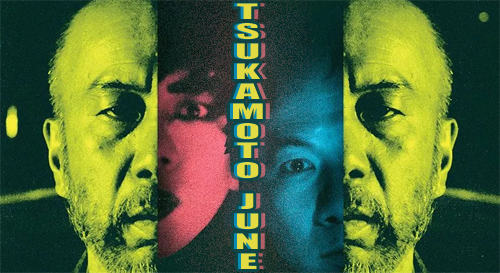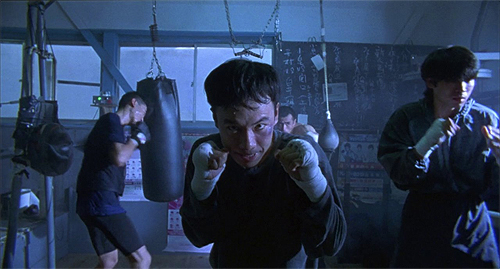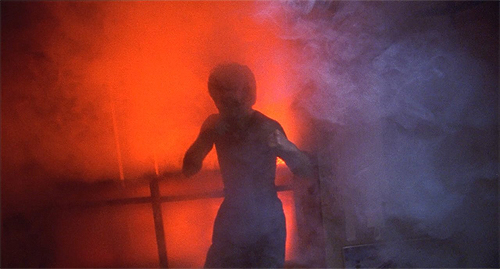Tokyo Fist (1995)
Directed by: Shinya Tsukamoto
Written by: Hisashi Saito, Shinya Tsukamoto
Starring: Kahori Fujii, Koji Tsukamoto, Shinya Tsukamoto

Available now from Third Window Films and on VOD
One day I hope to enjoy life with even a small amount of the insane energy found in the 16mm films of Shinya Tsukamoto. There’s no better example of this kind of kinetic electricity than in this fusion of sports and horror. You didn’t think a boxing underdog story and a series of surreal nightmares would be a good match? Think again. After flirting with the mainstream by directing the yokai adventure Hiruko the Goblin and making the first of two Tetsuo sequels, Tsukamoto returned to form in this brain smashing genre mash-up. In some ways it’s the true successor to the iron man concept, as two rivals punch their way through repressed memories and self denial.

The eponymous fist makes it’s appearance early on to make sure you know what’s in store. With an ear blasting industrial cue from Chu Ishikawa the screen itself, and presumably the head of the viewer, is pulverised into a mess of stop-motion tissue. The colour red is used sparingly in the run time but it’s always included to maximise the impact. Much of the story is a clinical affair full of blue glass and grey concrete. But there are sudden bursts of violence and rage throughout. The director would later return to black and white, and also take things even further with harsher blue filters, but here it’s all about that stimulating contrast between hot and cold. Both in the visual style and the characterisation.
Tsuda (Shinya Tsukamoto) is an insurance salesman who spends his time trying to make people think about their lives, while neglecting to do anything productive with his own. But under the surface he’s a petty and jealous man hiding from past trauma instead of confronting it. His former school friend Kojima (Koji Tsukamoto) on the other hand is someone who has found a real purpose in life. Since they last met he’s become hardened and driven. Or at least that’s how it seems to be on the outside. Tsuda’s quiet life is soon disrupted when Kojima decides to seduce his fiancée and dig up the past, which leads to them trading blows. But it quickly becomes clear that they are all using this external behaviour to hide a variety of personality flaws.
The action itself is surreal and gruesome, with carnage that rivals the style of Raging Bull and outpaces it in terms of shock value. In some ways it’s a strange break between rounds, after Scorsese and Stallone but before Fight Club. It certainly offers enough repressed masculinity and inner turmoil to chew on as the duality of its two leads is examined. Only through violence, and maybe even death, can their problems be resolved. Even the initially compliant girlfriend Hizuru (Kahori Fujii) has obscured urges that begin to surface through self inflicted pain and aggressive behaviour. This certainly isn’t your average love triangle melodrama, and they’re all in for a transformation one way or the other as things unravel.

The idea of who they were and what they’ve become hangs over the whole film. As a result this is also a story about lost chances and lost time as more of Tsuda’s situation is revealed. It’s too late for a normal resolution and only boxing (or just brawling) remains. Without direction he becomes lost, as depicted in a darkly funny sequence that shows him wandering the city for several days. It goes on for a really long time as his clothes become more and more dishevelled. Did he really want marriage? Is Kojima really the villain? Does Hizuru actually want either of them? Time only feels like it’s moving when blows are being exchanged, and the central trio don’t seem to feel alive without this sort of punishment.
However beyond all the existential drama this is also just an arresting thrill ride filled with gliding camera work and creative design choices. The harsh lighting when Kojima’s physical prowess is first shown is pretty incredible, as are the eerie choices that later start to suggest his lack of real bravery. Sudden close ups showing flashes of blood and broken flesh emphasise the horror of the situation despite the fantastic elements. There’s an obvious increase in production value next to the director’s debut, but it remains gritty and sinister rather than glossy or pedestrian. Even the score is less like music than it is just a sampled punching bag noise in certain sequences, perfectly fitting Tsuda’s newfound verve – and his lack of real compassion.
In the end it’s just a tale of people finding out what they really want out of life. Even if most of the results are not pretty, and in some cases they’re simply destructive. Whether any of this is cathartic or positive when the transformations come to an end is certainly debatable. Still, it’s all heightened to such a degree that it’s impossible not to get sucked in. It’s not a story that offers these kind of answers directly and that’s part of the beauty of it. Some story elements might seem archetypal at first but they soon become more extreme, more visceral, and more engrossing. There are workout montages and even romantic dinners, and yet it’s dressed in a kind of painful and nightmarish wrapping. It’s a movie with layers that demands to be revisited.
Rating: 









Be sure to check out the other reviews in this series


Be the first to comment